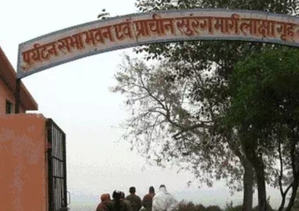Muslim side challenges court verdict on ‘Lakshagriha’ land in UP
By IANS | Published: March 8, 2024 09:28 AM2024-03-08T09:28:22+5:302024-03-08T09:30:06+5:30
Baghpat, March 8 The Muslim side has challenged the verdict that quashed their claim over a graveyard on ...

Muslim side challenges court verdict on ‘Lakshagriha’ land in UP
Baghpat, March 8 The Muslim side has challenged the verdict that quashed their claim over a graveyard on a 100-bigha land considered to be Mahabharata-era ‘Lakshagriha (palace of lac)’ by Hindus in Uttar Pradesh's Baghpat.
This comes almost a month after a court in Baghpat district quashed the Muslim side’s 1970 plea to restrain encroachment upon a graveyard.
The district court on Thursday set May 27 to hear the matter.
It may be recalled that the court of civil judge (junior division), Shivam Dwivedi, in an order on February 5, had quashed the claims of Muslims. The Muslim side had then said it would challenge the verdict.
Irshad Khan, a member of the Muslim group pursuing the case, said, “Soon after the February 5 verdict we moved the Allahabad High Court and the court gave us relief after studying all documents. It gave us directions to go to the district judge of sessions court and file the matter. Courts function on documents, and we have all the documents. There is no ambiguity. The dargah here is of Hazrat Badruddin Shah, the disciple of Hazrat Nasiruddin Auliya of Delhi. The Tughlaq dynasty used to rule Delhi then. Shah was a Sufi saint and buried here in Barnawa. After his death, a graveyard developed here. Members of the other community keep desecrating the graves of our elders.”
Muslim representation’s lawyer Shahid Ali added, “The verdict was given by the court of civil judge (junior division) and when the Muslim representation filed an appeal in the high court, it was accepted. But the high court directed us to make an appeal first in the sessions court and if there is no relief in the matter, then the higher court can be approached.”
Disclaimer: This post has been auto-published from an agency feed without any modifications to the text and has not been reviewed by an editor
Open in app